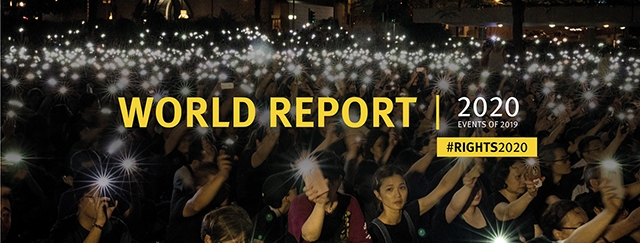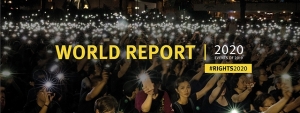The Human Rights Watch Report 2020
The World Report 2020 is Human Rights Watch’s 30th annual review of human rights practices around the globe. The 652-page volume reviews human rights practices and trends in nearly 100 countries. Georgia was among them, with an overview of the main failings and moves towards progress seen countrywide in 2019.
Lax Regulations Undermine Worker Safety
"Georgian labor law does not sufficiently regulate working hours, rest time, weekly breaks, and night work, and does not provide for government oversight of all labor conditions," reads the Human Rights Watch Report 2020.
“According to the Georgian Trade Union Confederation, 36 workers died and 107 were injured in work-related accidents through October. Georgian labor law does not sufficiently regulate working hours, rest time, weekly breaks, and night work, and does not provide for government oversight of all labor conditions. Lax regulations and resulting labor practices that often prioritize production targets undermine workers’ safety. For example, workers in some manganese mines work 12-hour shifts underground, including at night, for 15 straight days, resulting in exhaustion and increasing the likelihood of workplace accidents and injuries. In May, some 2,500 miners from some of these mines went on strike for 12 days, demanding better working conditions and a pay rise.
"Authorities drafted legislative amendments to address some of the gaps in the law regarding overtime, time off, and other issues, and to strengthen the labor inspectorate. The changes had not been introduced for parliamentary debate at time of writing”, reads the report.
Impunity for Abuse by Law Enforcement Officials Remains a Problem
"Impunity for abuse by law enforcement officials remains a persistent problem," reads the Human Rights Watch Report 2020.
“Authorities twice postponed the launching of the State Inspector’s Office, created in 2018 to investigate abuses committed by law enforcement and other public officials, citing lack of financing. It became operational on November 1.
By September, the Ombudsman’s Office had received 54 complaints of ill-treatment by prison staff or police and petitioned the Prosecutor’s Office to launch investigations in 52 cases. None resulted in criminal prosecution,” reads the report.
According to the document, on the night of June 20, riot police fired rubber bullets and used tear gas against thousands of protesters outside the parliament building in Tbilisi. “The protest was sparked by the presence of a delegation from the Russian Duma in the parliament’s plenary chamber, as part of the Inter-Parliamentary Assembly of Orthodoxy.
"Some protesters repeatedly tried to break through the police cordon, grabbing and damaging some riot gear. Otherwise the crowd was largely nonviolent. While riot police showed restraint initially, around midnight, without prior warning, they opened fire on the crowd with tear gas and rubber bullets, chasing and arresting people who tried to gather.
"Some 240 people, including 80 police officers and 32 journalists, sustained injuries and sought medical attention. Many civilians sustained rubber bullet injuries to the head, legs, and back; two people each lost an eye.
"Police arrested hundreds, and courts sentenced 121 protesters to up to 15 days in jail on misdemeanor violations.
"Authorities pursued largely one-sided accountability. They launched a mass rioting investigation, charging at least 19 protesters, 15 of whom remain in pretrial custody at time of writing. Opposition parliamentarian Nika Melia was released under house arrest. The Prosecutor’s Office designated 67 police officers and only four civilians as victims, depriving many of the injured protesters the opportunity to review investigation files. Following civil society criticism, three more people received victim status in November.
"Meanwhile, the Prosecutor’s Office charged three police officers with exceeding their powers and assaulting a detained protester; courts released all three on bail. The Interior Ministry reprimanded 11 law enforcement officers for misconduct and sent two cases to the prosecutor’s office. The Prosecutor’s Office authorized the Public Defender to monitor the ongoing investigation into police conduct”, reads the report.
ECHR’s July Decision Shook Georgia’s Media
"The European Court of Human Rights’ July decision finding no breach of fair trial guarantees in the ownership dispute over Rustavi 2, Georgia’s most-watched television station, shook Georgia’s media landscape," says the Human Rights Watch Report 2020.
“As a result, ownership reverted to a former owner, Kibar Khalvashi, who claimed that he had been forced to sell the station in 2006 below market value. Rustavi 2’s general director, Nika Gvaramia, alleged the lawsuit was orchestrated by the government to take over the station because it was seen as aligned with the opposition.
"Khalvashi appointed a new director general, Paata Salia, who pledged not to interfere with the station’s editorial policy. However, Salia soon dismissed the newsroom head and producers and hosts of political and entertainment talk shows, claiming they had conflicts of interest because of their public statements against the new owner. The move prompted almost the entire newsroom to quit, resulting in a temporary suspension of news broadcasts.
"In August, the Prosecutor’s Office brought “abuse of power” charges against Gvaramia, claiming he had struck a sham deal in 2015 on commercial ad placement on the station, allegedly resulting in the loss of 7.2 million GEL (approximately US$ 2.5 million). A court ordered Gvaramia to post 40,000 GEL (approximately US$ 13,500) bail. Some civil society organizations saw the “accelerated manner of the investigation” as politically motivated, likely “aimed at persecuting opponents and critical media.”
"In September, Gvaramia founded a new pro-opposition broadcaster “Mtavari Arkhi” (Main Channel) and hired many of former Rustavi 2 anchors and journalists.
Authorities also brought charges against Avtandil Tsereteli, father of the founder of TV Pirveli, another independent and critical broadcaster. The prosecutor’s office alleged that Tsereteli assisted former TBC Bank Board Chair Mamuka Khazaradze and his deputy in “legalization of illicit income” of $17 million in 2008. Civil society groups criticized the move as another attempt at “exert[ing] pressure on the independent and critical broadcaster,” reads the report.
Drug Policy Still Too Harsh
“Although the overall numbers of drug-related prosecutions continued to decline, authorities maintained harsh drug laws that can be used to prosecute people for mere consumption (except for marijuana) or possession of drugs for personal use,” Human Rights Watch notes, going on to add that drug-related felonies often result in long sentences, prohibitive fines, and deprivation of other rights, including the right to drive a vehicle or work in an array of professions.
HRW suggests a legislative reform that would “introduce public health approaches to drug use” and an overhaul of punitive practices.
Sexual Orientation and Gender Identity
The HRW 2020 report writers highlighted last June’s attempt to hold the first ever Georgian Pride Week, which was to include various social, political, and cultural events and a Pride March.
“On May 31, the Interior Ministry issued a statement saying that the events could not be held outdoors, citing the risks to people involved in the events,” the report reads, noting that in its June 14 statement, the Georgian Orthodox Church urged the authorities “not to allow” Tbilisi Pride, calling it “absolutely unacceptable.”
“Two days later, homophobic groups led by ultra-conservative businessman Levan Vasadze held a rally, announcing the formation of vigilante patrols against Tbilisi Pride and gay people. Police launched an investigation into Vasadze’s statements that had no outcome at time of writing.”
The report notes, however, that indoor Pride events did take place, and on July 8 around 40 activists and LGBT supporters held a pride march outside the Interior Ministry.
The writers go on to state that “in November, ultra-nationalist hate groups and their supporters organized protests against the screening of a Swedish-Georgian gay love-themed film, ‘And Then We Danced,’ in Tbilisi and Batumi, harassing and at times attacking moviegoers. Police said they detained 27 people on misdemeanor, disobedience, and hooliganism charges, and one person faced a criminal violence charge.”
See the full report here: www.hrw.org/world-report/2020/country-chapters/georgia
By Ana Dumbadze
Image source: HRW











